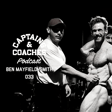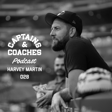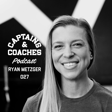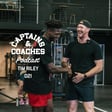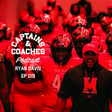Introduction to Leadership Insights in Sports
00:00:00
Speaker
Welcome to the Captains and Coaches Podcast, where we explore the art and science of leadership through the lens of athletics and beyond. I'm your host, Tex McQuilken, and today I'm stoked to bring you a conversation with someone who's not just a mentor and a friend for over a decade, but also a guy who taught me that leadership isn't about having all the answers. It's about asking better questions.
00:00:20
Speaker
Meet Coach Donnie Mabe, author of The Secret Sauce of Leadership and the latest two buckets of leadership both found on my bookshelf. Donnie's packed these books with decades of wisdom from his time as a Georgia Bulldog football player to coaching national champions at the University of Texas.
Distinguishing Great Leaders
00:00:38
Speaker
He's distilled these into frameworks that actually make sense for the real world. Whether you're a coach trying to build a championship culture, a captain looking to rally your team, or just somebody trying to figure out why your leadership style feels more like chaos coordinator than strategic visionary, you're in for a treat.
00:00:57
Speaker
Listen close for the principles that separate good leaders from great. Unpack his game-changing two-buckets framework and discover the secret sauce that makes it all work. This is leadership, unplugged, unfiltered, and occasionally uncomfortable, just the way growth should be. With that, let's hand it off to Donny. Ready, ready, and break.
00:01:28
Speaker
Welcome to the show. Coach, thank you for having me, Tex. Appreciate it. I'm excited. The secret sauce of leadership. This was my sauna book. As you can tell, it's got some wear and tear in it. I like it. That's where you got to do it.
00:01:39
Speaker
hey you never read it You are in the the thick of it, so I got some underlined quotes we're going to cover, but I really want to dive into the two buckets of leadership, because the overarching idea, the theme of the gasoline and the water, that's just an awesome visual. Right.
00:01:57
Speaker
I mean, let's start with the visual, the two
Two Buckets of Leadership Explained
00:02:00
Speaker
buckets of leadership. And we had a conversation earlier where this book branched off from the secret sauce. So what was the origin split? And you just had this grand idea that somebody thought, hey, this could make another book. The backstory on that, when I wrote the book, those books were actually, they weren't together, perfect, obviously.
00:02:25
Speaker
It was one book, it was like 310 pages. It was a book on leadership, you know, submitted it to my editor. And as they started going through it, they just started looking at it and go, hey, you've got, this is a big book. It's 310 pages. The average nonfiction book is 200 pages or less. And of course, I didn't know any of this.
00:02:47
Speaker
and they go we think you got two books here if you're up for you don't have to we can do one book so i actually took some time went through the outline um and just started playing around with it the material and sure enough came up with two it it kind of worked out nice that the two outlines just ended up being kind of About the same, 150 pages. And um the the first the secret sauce was a little bit easier because I already had a working title for that one. This one I did not at first. The second one, the two buckets. And so that was a little bit harder, the second book, to kind of organize once I kind of made the decision. and So that's kind of how it happened. Started out as one book, but kind of divulged into two. ah the The secret sauce, more about your
00:03:33
Speaker
these personal, professional, those small things you can do to stand out as a leader, whereas the the two buckets leans more into your style in art with leading like groups and teams and more of a kind of a higher level as you kind of move up position.
00:03:49
Speaker
That's the natural progression as a professional, whether you're a coach or in the professional realm of business, because you have to take care of yourself, self leadership, all the intangibles, and then now you get an opportunity to manage and lead others.
Career Development and the Sigmoid Curve
00:04:04
Speaker
Yeah, that is a natural progression. And again, it's there, you always got to work on both of them. But again, like you said, secret sauce a little bit more kind of foundational.
00:04:14
Speaker
Mm-hmm. That's great. So in the two buckets, you lead off with the sigmoid curve, which I want to spend some time. I love that, yeah. Because you handed off a book to me half time. Yeah, Bob Ginsburg. And then the sigmoid curve was a big part of that as well. So then you're leading off the book with that. So explain to us this visual of the sigmoid curve. Yeah, it's simple, right? If you Google it, it pops up, I think, anywhere. And it's just this kind of,
00:04:44
Speaker
premise of we all start out like in your career usually in your early 20s and I'm not again I've got four dollars and I've got two of them going through this right now I had this conversation just a couple nights ago with one of them.
00:04:58
Speaker
You usually don't start off great. You're usually not doing what you always want to do and like, man, this is what I've dreamt of doing and being in an office or whatever it is, long hours, kind of low man on the totem pole. You start off, you kind of dip it first and then as you start to kind of build your reputation and you learn some skills and credibility and you get promoted. Then, you know, mid to early twenties, you start to climb. You dip down at first, it kind of, it kind of valleys out and you start to turn that corner and you start to climb from, from your probably late twenties. I think in the book he talks about, um, it's probably mid to late 40s. You really start to kind of get near a peak and then you just, you, you can peak out anywhere in your yeah early to mid 50s and then kind of plateau there and then start to to decline again. And so that's kind of what it is. It's, I wouldn't say it's a, it's a linear thing for everybody. Sometimes it's a little bit more up and down, but that's definitely a model that ah you see in a lot of people's careers. It's pretty, pretty clear.
00:06:02
Speaker
Yeah, and some people, I mean, they reach that peak and they're not willing to take on a new task, learn a new skill. No, and I think for me, the you know the the critical piece of the sigmoid curve, which Bob talks about in the book, the halftime.
00:06:18
Speaker
the first sigmoid curve is all about your success, it's all about you. And you see this in coaching, you see it in coaching a lot um where coaches that get older and they don't know what to do next. They've been successful, they've won a lot, but then what what do you do next? And so that's, you start that second sigmoid curve sometime late 40s, early 50s, mid 50s, where you dip it down again while you're still climbing in your first one,
00:06:44
Speaker
Right? And that second curve is always about significance. It's about giving back and what are you going to kind of leave behind. So I think that second curve and second part of your career, I think a lot of people struggle with like, because it's not always clear, how do you do that? You know, what's some, some on-ramps for that? And so,
00:07:05
Speaker
it's not always week because I think sometimes you're so good at what you do when you start that you're so kind of entrenched in your what you're doing now it's hard to think well how can I go back to being not good at something yeah as I start this second thing so I think that's the hard part for a lot of people. Time out. Are you beat up burnout and changing your workouts to what you think it's missing?
00:07:25
Speaker
If you're changing your own training program, I don't think it's the right training program for you. Give the old bull program a ride. It's a movement practice designed for the thinking man who's ready to train smarter, not just harder. We've eliminated your excuses by creating a flexible program that adapts to your schedule while intelligently addressing the wear and tear from years of grinding through poorly designed training. Each day offers options that honor your body's needs while still challenge you to grow stronger and look the part of a leader. Our programming systematically rebuilds your foundation, healing those beaten up shoulders, cranky hips, and stiff back that's holding you back.
Humility and Confidence in Leadership
00:08:06
Speaker
Join a community of lifelong athletes who've learned that sustainable progress comes through intelligent training.
00:08:13
Speaker
the old bowl program, wisdom through movement. Click the link in the show notes for a seven day free trial. Now let's get back to the show. Ready, ready, and ready. In the book, you paint that picture of of small wins, small beginnings to then, I mean, re-vigorate and empower them as you learn a new skill. You're going to suck until you don't.
00:08:35
Speaker
Yeah, it's kind of like, you know, years ago I took martial arts and it stinks to go back to being a white belt, you know, or a yellow belt. That's kind of in the belt, if you know a belt system. Black belts like the the top belt, traditionally.
00:08:52
Speaker
but a white and a yellow belt, you don't know anything. You kind of get pushed around a little bit. You're kind of awkward, it's kind of clumsy. And so anytime you start over to learn something new like that, it's gonna be a little tough at first. yeah you know but it But because you've done something before, usually if you've been successful in any career, you can usually speed it up a little bit in a second career or second pivot. Do you feel your transition from football, because you were a football player,
00:09:19
Speaker
then you were a football strength the edition coach, then to the Olympic side. Was there some relearning, new learning for that transition? Yeah, you really, I think it's more about, you know, performance with athletes is performance. There's a lot of changes going on in that world right now, right? With technologies changing, it's driving most of it, I would say, you know, the data.
00:09:42
Speaker
But I would say one of the, you know, I think anytime you go from like a football culture where you don't have full autonomy and you transition over to like an Olympic culture where you're gonna have a lot more autonomy, sometimes full autonomy depending on your position, there's a lot to learn there. And I would say the biggest thing is just not, just seeing the big picture, yeah you know, that you're dealing with a lot of personalities, a lot of philosophies,
00:10:12
Speaker
lenses that people are seeing and evaluating, things that used, you know, in football, everything's kind of very similar and simple. in that, you know, you want your guys big, fast and strong, but that not be the way you get there, may be way different than, or may not be a metric you look at in some of the Olympic sports. So yeah, you've got to change, you've got to broaden your spectrum on how you look and evaluate things and change as a leader. So it's different. Yeah. Do you feel that the sport coaches are different from Olympic side to football? Or is everybody pushing and fighting and willing to win?
00:10:48
Speaker
No, it's different. I mean, you'll meet some Olympic coaches that like they don't really think the weight room makes that big of a difference. yeah Whereas most football coaches, like that is where we get tough in the off-season. And so you've got to be a little bit more of a salesman, and you've got to be tactful in how you present a lot of that, you know and how you kind of explain. You've got to do more educating sometimes on the Olympic side in selling your program, selling yourself.
00:11:16
Speaker
and there's different ways you can do that than you do in football, oftentimes. Football is more, you know, they're always calling each other and comparing, like, well, we're not doing this, or, you know, it's always, they're chasing, you're always chasing the shiny toy, I call it, of what, well, you know, what the program down the street's doing. And you're usually doing it, it just may be a different way or presentation. So there's not really nothing new or novel, I feel like, in football these days, so.
00:11:42
Speaker
Well, technology is working in there. Yeah. And then that leads to recruiting because now we're showing, hey, we got this new shiny toy and the recruit that appeals to them. Yeah. Got to buy it. yeahp ah Yeah. Get some excited.
00:11:56
Speaker
Yeah, very much so. So within the realm of the small beginnings, you highlight maturity, perspective, humility, competence, and then flops. I feel flops is an important way to highlight because it takes perspective, it takes humility, and then you realize where your fall was. in highlighting flops, just acknowledging any Any flop is a big win for coaches. So what self-awareness leads to like learning from mistakes versus hiding and covering up or not telling your mentors that you made a mistake and you messed up.
00:12:36
Speaker
Yeah, that's good. You know, I think when you start looking at failures, and and this is again, I'm talking about myself in this equation here, there's a book called the the art of leadership and self deception. And it's it's a good read. It's simple. But I think when you start talking about mistakes in in self awareness,
00:12:56
Speaker
Oftentimes, the the crazy thing about pride and arrogance and when you start looking at that, you you the one the number one thing pride will do, it kind of deceives you into making you think and ah making you believe you're really better than you are. Again, you can be really good at what you do, but if you start to take yourself way too serious and you overestimate the value of your own importance, then your ego becomes really big.
00:13:24
Speaker
Now, let me be clear. There's nothing wrong with having an ego. I have an ego. Everybody has an ego, but I always say you got to keep it on a leash. you know And by what ah what I mean by this, you've just gotta keep, you've gotta have the people around you that are not just always the yes people, they're gonna kind of hold you accountable or call you to the carpet in a in a respectful way when you're when you um when you do do something that's maybe not right or up to par. The other part to that is having people around you, but I think,
00:13:58
Speaker
There's another book called Leading with a Limp I read years ago. I remember, and I've taken this to to the bank today, whenever I interview somebody or if I work with somebody who says, man, they don't have any flaws, I usually run. Like, what's the hardest thing you've been through? Well, I haven't really been through anything hard. What? Let's not let it be here. Right. I'm like, oh, you really think you're the cat's meow.
00:14:24
Speaker
Right. And so you can, I mean, you can see it on people. I have literally seen coaches and staff come in, start small, stay humble. They start to have a lot of success and you can just see the ego getting big. And they start to change how they talk to people, how they treat people, their own importance.
00:14:41
Speaker
Um, the way they operate, you just start to see that. And again, you've got to have competent competence. You've got to have confidence to be great at what you do, but there's gotta be some humility in there. And again, that humility is not.
00:14:56
Speaker
And I think false humility is saying, well, you can't ever accept praise for a job well done, or you've always got to kind of downplay yourself. I think that's false humility. I think to be, like true humility, one of my favorite quotes is true humility in life is not thinking less of yourself, it's thinking of yourself less. Yeah, so that's one of the ones from the secret sauce I have underlined and bookmarked to get into.
00:15:24
Speaker
Yeah, I mean, I think, again, true, really, like, if you see good humility, it's actually attracting, right? It's strength under control. Like, you're really strong. Yeah. You're really, you know you're good, but you also know that It took a long time to get where you're at. You've made some mistakes, but you've taken some bumps and bruises and you've learned from it. And you realize that like, I need, you're going to need help, right? It's not it's going it's not just going to be all on you. You're going to need to have some people around you. And there's some humility there, some depth. And I think emotional stability and maturity goes along with that.
00:15:59
Speaker
The reason I i highlighted and underlined this the following line, if you have a problem with receiving compliments and credit and are always dismissing it to someone else, watch out. So then where that jumped out to me is it was I ran into this not false humility. I just didn't believe it. So it was so on the other side of confidence and perfectionism that I was not willing to receive the compliments because I had just other external forces telling me otherwise. it jumped out to me to truly dive in and understand humility of what it actually represents and then how you can still build people up and have them not even with working with athletes still building them up,
00:16:47
Speaker
but not to the point where they're floating away. this was an important just note that I took away that I struggled with. I didn't feel it was false humility. It was just no confidence. I feel like, you know, I forget the exact details on the story, but Icarus, right? the parable of the story, I think it's a Greek fable about a guy that wanted to fly, right? And so he builds these wings and puts these feathers on them and puts wax on the feathers to glue them to the wings. And if he takes off the fly, if he flies too close to the sun,
00:17:25
Speaker
right? The wax will melt, the feathers comes off, it don't crash. But if he flies too close to the water, he can he can still crash too. So it's kind of like that, you know, humility is not getting so high and and so far from people that you think it's all about you. But good kind of going back to what you're saying, don't be so just false humility where you can't receive, you know, compliments.
00:17:48
Speaker
and praise for a job. mean, I think the best thing you can do if you're one of those people that struggles with that, just say thank you. Just receive it. Have the humility to receive that. That if somebody acknowledges you for doing a good job, because you'll see both. It's usually extreme, right? Somebody's really arrogant and cocky, and it's it's all about them or somebody can't really receive the credit for doing it. They just keep working their tail off. And now you don't want to work with them because they're really, they're still prideful too. It's just cloaked differently. So it's a different way.
00:18:19
Speaker
Yeah, and then how I've aimed to manage that is just honor that they put themselves out there to pay the compliment, so then respecting that they're willing to. Be brave to give, I'll be brave to receive.
Emotional Stability in Leadership
00:18:39
Speaker
It takes security to do that. At the end of the day, pride is insecurity at the end of the day. Somebody who's really prideful, they're very insecure, can't take feedback, but they also can't receive you know compliments usually. it kind of It can manifest two different ways with people. It can be cloaked in false humility. The pride can cloak itself in that that sheep's clothing. It's a wolf's tail. right and so It just takes different things to make it come out.
00:19:08
Speaker
Yeah. you've had an array of experiences with different athletes from football to different sports, volleyball, males versus females. So what are some, I guess, warning signs where you get the cocky freshmen coming in that then, okay, I got to get ahead of this before the sport coach runs into these these characteristics or these potential, I won't call them flaws, but potential performance limitations of of how they're acting.
00:19:37
Speaker
So what can you do as a strength coach to now, okay, let's level set on their skillset, so that way we can be coachable when when you hand them off to a sport coach. Yeah, I mean, I think there's gotta to be...
00:19:49
Speaker
You know, being a strength and conditioning coach, you kind of have a unique, the way ah you know I took, in college I took all these classes, but one of the, and I think I talk about it in one of these books, I can't remember which book it's in, but when you take a lab, right, you can we consider, you and I consider and talk about this, and it's great, and but the the weight room, as you know, is ah it's kind of like a laboratory.
00:20:17
Speaker
where you can kind of bring your your athletes in there and you can intentionally put them in situations where things get exposed, whether it's a lack of communication, teamwork, they're insecure, they're prideful, right? Or maybe they're maybe they're just emotionally immature. And so whether it's putting them through, I like to do, have different exercises in the weight room, whether it's team building drills, or they have to solve problems. I know I've literally done this in the summer where I'll take all five of the racks, or we'll tear the racks apart, put put the team in groups, ah to divide them up into groups evenly, and give them packages with instructions, or they can't talk, but they've got they've gotta to communicate, and somebody's going to have to be the leader. don't Don't designate a leader, and just watch how they act. you know
00:21:11
Speaker
I mean, I think a lot of, and we're seeing this a lot too. Tim Elmore talks about this in his book called Generation Z Unfiltered. It's a phenomenal read on this on the kids today we're working with. And he calls it, there's two different categories. There's prescriptive,
00:21:30
Speaker
in descriptive ways that you can leave kids today. but Prescriptive is the way most parents deal with their kids and coaches. You see it in coaching too. They'll literally list out everything they want them to do from A to Z. yeah you know Get up at this time, fixture this, do this, get your bag packed.
00:21:50
Speaker
And they'll literally, I've seen coaches do that. They'll create a list of to-do and they'll code them to that. Like, have you done A, B, and C? And they'll remind them, hey, next tomorrow, be sure you do these five things before you get to campus. Don't remind them of that. Versus Descriptive is like, hey, this rack is out of order. Fix it. What do we do first?
00:22:11
Speaker
Talk to your teammates, well look at the rack, I don't know. You tell me what you, I'm not gonna give you a list of things, I'm gonna give you a problem. Now you gotta talk to your teammates, get them to organize the strategy, the steps, and the style of how you're gonna fix that. You guys come up with it, come back to me and tell me how you're gonna do it. That's descriptive. They don't know how to do that. No. Because that requires,
00:22:36
Speaker
communication, there's gonna be, with if you put five people in a group, there's 100% gonna be conflict in that group of what we should do first to fix that. And then once they have conflict, how do you work through the differences of opinions of what we should do first? And then like what's our so what's our strategy?
00:22:55
Speaker
Now who's got what strengths on this team that we built and in who, how are we gonna organize this and put people on different orders to do different tasks to be successful as a team. So you can do a lot of that in the weight room, not just give them a sheet with power clean squat and bench on it.
00:23:11
Speaker
Yeah. And so I think for me, that's why I've loved about being a strength coach. You can put the, and that's just a prime example I've done. We've done other things. I mean, one summer we took them, I've done, it's actually a couple summers, take them down to the boathouse to let the, the rolling teams work with them. Yeah. And put them in a situation where they have no skill. They have to listen.
00:23:32
Speaker
to these girls coaching them. They have to receive feedback. They have to stop and start over and be frustrated with that process and kind of be that white belt again, what I'm talking about. But be on a boat with maybe some girls that they normally are on the court with.
00:23:47
Speaker
in those positions that they have to work with. And so now you're starting to build chemistry and culture a little bit outside the the court or outside the weight room. This may be a little bit different. So I love putting them in those situations where they're just uncomfortable. yeah So that's one way you can do it. I like that. Did any girls leave the volleyball team to join the crew team? No, they did.
00:24:08
Speaker
I mean, True Story we had one year, it's been many years. We had one girl that she had a near-death experience with water years prior to that. And she had to overcome her fear and get in that boat. Oh, wow. Now, we made sure that she was good to get in there. We didn't like, you know, I gave her a heads up. But it was actually turned out to be a really positive experience for her.
Culture's Role in Sports Leadership
00:24:28
Speaker
I bet. So, I mean, we've we've done stuff with girls that You know, we've done diving challenges in the swimming pool, put them in teams and girls that that did not want to jump in the pool, gently they jumped off the one meter board, not the the three meter board. Just, it's good. I mean, yeah at the end of the day, getting kids to be uncomfortable and kind of face some of those fears, but to have their team there to support them, yeah it makes a difference, you know, so it changes them.
00:24:56
Speaker
Yeah. And then, I mean, you're observing not only the person in the stressful situation, how the team is reacting. So you can pinpoint, oh, this, this person was more vocal. This person was not as vocal. You can anticipate that same approach during a game. So now we can help train them how to react and cheer for each other from the sidelines. Yeah, you're not gonna change anything in in an athlete or a person unless you put them in an environment that forces them to change. They're just not going to. we can talk i can have I can have goals, I can give feedback, we have meetings, have the parents come in, the coaches, they will not change until you put them out there and you actually let them fall, be uncomfortable and just keep trying. That's the only way we can do that. So fun team building drills, that's the opportunity to to test and build this character.
00:25:48
Speaker
I mean, what are some defining moments that led you to this style and this approach? Were you a former perfectionist as a coach? No, I would say, you know, some of this has been, so if you follow sport collegiately at all, the transfer portal is big right now, her right? And so now you're starting to kid, I mean, we'll get kids some, I've had recently a couple of kids that we've only had for like four or five months.
00:26:14
Speaker
Some of them, you only have them for less than a year, some of them two years. And so they're coming in already physically pretty developed, here but they're lacking this culture piece for our team. And so you've got to start, just like you would prioritize like, and I think we were sitting in the meeting, it was a couple of years ago, maybe it's been two or three actually now. We were sitting in a meeting with an NBA team, right? I don't want to say the name of the team.
00:26:42
Speaker
And they've actually got metrics, just like we got metrics for sprinting and jumping and body comp. They've got metrics for like locker room culture, how they influence and and lead on court, you know, a lifestyle, character flaws. So you're starting to see this in the pros because they realize these off-site pieces are influencing and having a dramatic impact of what happens on the court. Yeah. And so you're seeing kind of, because what it is with NIL and Transfer Portal, college sports are becoming a little bit more professional hence sports. And so now,
00:27:20
Speaker
the culture piece is becoming even weightier. Even though it's a buzzword and people don't like that, it's a reality, yeah right? It's ethos, right? it's a breath It's breathing, it's living, it's changing all the time. And so you've got to you've got to have elements of your training now where you're addressing, and not so much you're not trying to expose people, but you're trying to show, hey, this is this is a weakness we have, and we've got to strengthen that so that we play better as a team on court, because we're so talented.
00:27:47
Speaker
yeah We're so gifted, we've got the we've got the right people, but if they're not connected and trust each other on the court and work together as a unit, then we're just not going to be as good. So you've got ah you've got to sprinkle and put some of that in with your offseason. You got to now. That's the value of the offseason strength coach, because you can test it and then shape it. You can coach. It's not just assessing, writing down, and then handing off to a sport coach, now you're leading and helping build that if it's a limitation versus the the physical capabilities. Yeah, and you do it when nobody's watching, right? It's just, and it's so controlled and you can have some of those hard moments that's not embarrassing or it's shameful if it happens in front. You know, always, you know, I like to say it like this, right? It's like, um
00:28:33
Speaker
you know, every, every private victory in our lives is always preceded, excuse me, every public victory is always preceded by a private victory. So we want to work on all that stuff when there's not as many eyes on you. So that when we get in that, when you get on that platform where the whole world's watching, now we can be successful. And so do that kind of in the off season, when you have time, and then it usually shows up, you kind of, you get to pull that investment out. I got a book recommendation for you now. Go for it, yeah. So in line with the NBA, so there's a book called Boys Amongst Men, and it highlights... Oh, I've heard of it. It's amazing. It highlights the 10 years that the high schoolers were entered into the NBA draft.
00:29:12
Speaker
And so each chapter follows a different story. So we know the Kevin Garnett's, the Kobe's, all the successful stories, TMAC, but then they highlight the guys that like we we never even heard of. And so the destructive nature where you give these guys without mentorship, $10 million, dollars signing bonus, and what happens.
00:29:34
Speaker
So they also deep dive Kwame Brown and Michael Jordan. So then more of a different form of leadership style for him. So it deep dives all of this. And then one of the themes from the author is leadership.
00:29:51
Speaker
because now teams were willing to gamble and roll the dice on a high school kid in hopes that they can get a Kevin Garnett. And the teams that had a team mom in place, like the Toronto Raptors with TMAC, those individuals, those high schoolers were more successful because they had the mother figure in place. Teams that did not have that, the culture was a big low piece and then he theorized that that 15th man on the roster, you could gamble on a high schooler or you can keep your veteran. So Dr. J in his twilight years wasn't getting a lot of minutes, but he was teaching Charles Barkley how to be a professional. So then now instead of that 15th man, 15 year vet, he's off the team and we just got this 18-owned high schooler.
00:30:40
Speaker
So then he theorized that it set the league back 10 years because they lost the leadership. It's dense, but it's great stories and engaging and entertaining. And there's little leadership nuggets in there that I was picking up on that may not been purposeful, but still there.
00:30:57
Speaker
No, like the picture I kind of comes to mind when I hear you, you definitely got to have the younger athletes, whether it's a, you know, you said it was a Dr. J, right? He was mentoring Charles Barkley or like the team mom. Like you've got to have some guardrails in there, especially ah if it's a younger athlete.
00:31:16
Speaker
that maybe they didn't have the support or the mentoring before previous before they came there, but you got to have guardrails for them, or they will go off a deep spot, so it won't be good. You got to have it. So now, in in line with the offseason, you have your seniors, you got national champions, and then you got freshmen coming in or transfers that are coming in from a different program with their own habits, belief systems,
00:31:42
Speaker
perception of how a team, maybe they're the big fish in the small pond high school, coming into a national champion. So how do you help the the leaders introduce introduce these freshmen to a very competitive winning team? You know, we do some unique stuff in that, you know, one thing, when the girls travel, they'll rotate rooms. So you're not always just the same person.
00:32:09
Speaker
Kids, just humans in general, we tend to just always stay stuck in a rut, right? We kind of get in our little clique. and stay with that, so the more you can rotate, you know, pairing people up, whether it's in a ah rack, in a wave room, maybe it's an exercise you're doing, you rotate who they're pairing up with a team, and just making them like, the one thing I love to do too, and I got this from John Gordon, we'll do in the summers, we'll do a Friday morning, I call like a leadership meeting, and we'll go, we'll read a book together, but it's more about
00:32:45
Speaker
um Just kids get to know each other, like we'll do, it's that he I think John Gordon calls it the three H's, right? So it's a hero, it's a hardship, and a highlight. And so everybody goes around the room and they talk about who's their hero.
00:33:01
Speaker
right who's the heart what's What's a hardship you've been through? And then what's a highlight? And it's pretty powerful when you really start to see, you start to learn the different values in the room by saying, who do they look up to?
00:33:15
Speaker
right But then you also learn what they're struggling with a lot of times with a hardship. And in what you end up see people, when you start being vulnerable, that allows a bonding process to start to take place because now kids know what you're, they're struggling with and then how they can relate, what kind of, what brings them together, right? And then a highlight of like, what's a proud moment in their life that you can honor somebody and respect and look up to them a little bit bit differently.
00:33:42
Speaker
And so there's there's not a time we haven't done that in the summer. And we'll do something different every Friday. um why One year, we had so many transfers. Coming in again, it wasn't like the whole team, but we had more than normal that a lot of looked across the room and I noticed that a lot of the kids in the room didn't know what it meant to be a Texas volleyball
Incorporating Team Culture and Tradition
00:34:05
Speaker
player. So I reached out to a lot of our alumni and we would do, I call it like a legacy Friday where the,
00:34:11
Speaker
We have one or two of the girls on a zoom and they were just talking, out let's take them through an interview. Kind of what we're doing now. Hey, what does it mean to you to be a Texas volleyball player? What lesson did you learn that you wish you could tell yourself when you were sitting in the seat? A lot of these girls are now.
00:34:28
Speaker
What is your biggest hope and aspiration for these kids that are coming in now that's never been here and just let the let the alumni talk and speak not for me and It's just cool to hear those stories and I got that from I forget the name of the book coach But it was used I can't give it to you later but he was in a book talking about the all blacks when they you know when they went through There was a time there they went through a really low point of there that that club from New Zealand of just bad, just not successful. What they found out was they had stopped telling the story of the All Blacks to the team, the guys they were bringing up in the club at the time. So they had to go back and start retelling those stories of success and connecting the past
00:35:15
Speaker
with the future. Of course, some of it was culture. They had to get some of the... Was it culture code? No, was it wasn't. I don't think it was that. I think it was a different book, but I've read that one too. But they they had stopped telling that story of of the All Blacks, of what made them successful in the past. They had to bring that into the present to the guys that were on the team. It it helped kind of connect that bridge and they they started winning again. And we all of us are tied to a culture though,
00:35:45
Speaker
that we can't forget, you know, especially if you've had any success. And I think a lot of teams can do that. You get so successful, you start drifting away, and you forget kind of what kept you there. Some of those those, almost like, they're just like the, not heroes, but just some of the figure, the athletes have just had so much success. Well, we we I mean, we had two or three girls, you know, we got a pro volleyball team in Austin now.
00:36:14
Speaker
and a lot of those girls that have been successful are coming back. When I introduced them, I'm like, here's the foundation. That's what I call them, the foundation, because they have literally laid brick and mortar, yeah you know, metaphorically speaking, the program of being so successful from different generations.
00:36:30
Speaker
And those girls can tell you what it takes to be successful. The young ones coming in don't always know. And so they've got to be retaught too. So it's important. That foundation, that story, that's what I admire because you don't have it. And now you get the opportunity to be a part of something that that does build it.
00:36:48
Speaker
And sometimes maybe you're one, two, three years with the team, you don't quite make it, but you were an important person laying the bricks and the foundation for the future success. Yeah, it's different if you come into a program that's successful versus building one. to be That's a way different experience. Yeah. It's different to be handing something to you right now. You've got to protect and defend that versus building it. Yeah. That's different. It's just two different Yeah, i approaches my said it like this, this is a case study or this is a sports movie. So now we are a part of something that's the big turnaround that they're going to tell about us someday. So aiming to frame it that way. ah Yeah, depending on the age of the kid, high schoolers don't care about case studies, but I do. So it's an interesting perspective of of building that.
00:37:38
Speaker
And I like the hardship component because now it's building empathy. I'm gaining sympathy, empathy, and I can feel how or why you're reacting one way if I'm knowing where you're coming from.
00:37:54
Speaker
I feel that's an important piece. And then now, aiming to shape certain reactions to hardships that we are intentionally applying through weight room and training and team building. Yeah, hardship, right, always, you know, you usually get a lot of emotion with that one. ah here And you learn, yeah I don't care, every time it changes the way you view your teammate.
00:38:17
Speaker
because you didn't know that's a part of their heart and soul, you didn't see. And so now the way you view them and you when you learn, I mean, I would this is summer i i learned about one of our kids I never knew. And I just viewed this kid differently because I didn't realize she'd been through such a hard and season of her life. you know But now I understood why, I'll never forget when I was with football years ago,
00:38:45
Speaker
I had this one kid that I just could not reach and connect with. He didn't want to work with me, didn't like me. No matter what I did, if I was tough on him, if I was easy on him, he just could not. And then finally one day, he got to tell him a story to somebody and I would listen to it. And it was a kid that he'd grown up without a dad. And I didn't know that. And it was so, the wound at him was so deep.
00:39:14
Speaker
that he had told the story when he was in court. His dad basically disowned him in front of everybody. He walked down on him right there in the courtroom when he was a young man. And when he told me that, my heart, I had a way different perspective on. Now I understand why the kid, and so my approach to connecting and coaching completely changed. And I finally started having success with him. But it was the the change had to happen to me on how I viewed him through a different lens in my approach. It had to happen to me, so. but You feel that was a defining moment for you as a coach? 100%, yeah. You've got to know where these kids are
00:39:52
Speaker
you know out the The hard part with social media today that I still get frustrated with is when people are so harsh on kids. They don't know what's going on. no They don't know what they're they' the that maybe battling depression. theyre Their mom and dad just went through a horrific divorce.
00:40:11
Speaker
They're, you know, socially struggling. They're not bidding on their team. That's why they're not performing right now. It's not because the kid doesn't care and they're not trying or that we recruited the wrong kid. It's like we're trying to help this kid.
00:40:26
Speaker
they're They're human beings too, and they have a life and a story outside of that what you're seeing. And so I think oftentimes that's where people just, they just lack understanding and the compassion for kids today that they're still, the kid oftentimes always say, these kids are growing up right in front of us and they're going to, you know,
00:40:46
Speaker
not to be too gross, but they're gonna mess their pants. They're gonna make mistakes. And it's our job as coaches to support them, help them get back up on their feet, grow from that mature and and take the next step next step forward. That's our job too. It just, oftentimes you don't get that support from onlookers. You just don't. I spoke to my alma mater lacrosse team a while back. And then I was in the middle of halftime So then the lesson that i I delivered in my little speech resonated and this just, I got a reminder and I i drew a box here in my notes because in halftime, he talks about building your fence or having your box. I can't remember the the exact picture, but that's the message that I gave him.
00:41:30
Speaker
like We're literally going to write write a box here, and the the drill I gave them on a whiteboard is I drew a big box, and then they every problem, everything annoying, and i mean they they put it all outside the fence, and then I had them write another teammate's name inside the fence.
00:41:50
Speaker
and just painted that picture of everything outside of this fence, it doesn't matter. like We have each other, and this was spring break, and it was going to be a ah turning ah moment for the team because we still had time left to to make some playoff runs. So that that was the the picture that I helped them realize. like Twitter, whatever, doesn't matter. Like, it matters to everyone in this room right now. So that, um yeah, I remember that from halftime and then rolled that into just helping give the kids a opportunity to realize, like, it doesn't matter. Like, what matters here is is in our room with our our guys. Yeah, that yeah that doesn' it that doesn't happen quick. No. It takes time and space. So you got to be patient.
00:42:36
Speaker
ah Yeah, I've been spending a lot of time with ah youth development and then learning the the social emotional path and growth of kids from walking to to middle school age. And that opened a lot of ah just perspective for me. because And I reflected on moments in my coaching career where I had conflict with kids.
00:43:00
Speaker
And ah you know I had college kids showing up to practice drunk when I was a sport coach. So then I would butt heads and blame them, but then not realizing like, OK, well, why are they doing that?
00:43:12
Speaker
So I was blaming and labeling them, but then within the social, emotional learning and development of kids, now I'm seeing like when when you are learning responsible decision making, when you start to integrate team team games and drills in PE class in elementary school.
Developing Athlete Self-awareness and Communication
00:43:30
Speaker
So all these different conflicts that could potentially come up from home that then blocks them from learning this these tools and tricks from ah from the school system or from athletics at that that young age.
00:43:45
Speaker
So now it's certainly a turn of the page for me as a coach, like when there are our behavioral problems, like investigate versus fearing for the team being negatively affected. Let's let's go find out what's going on from from their perspective and not just labeling them from a ah bad suit. Yeah, I mean, I think to your point, I think kids,
00:44:10
Speaker
I wouldn't say, I'd say there's definitely, depending on the kid and how they were raised, they may not have a lot of like really good self-awareness. I mean, some of our biggest problems we've had is kids coming in that don't realize how they're coming off to people.
00:44:33
Speaker
um Again, some of that could be from selfishness, some of it could be from, you know, a tough childhood being grown. um And then sometimes there's just...
00:44:44
Speaker
there's they've been and It's been enabled in them. It's so entrenched. So to your point, there's there's ah there's a process there of feedback and coaching and working with kids that, you know especially if it's not there or if it's not very strong, it's going to take some time to to develop that in them. you know Not always easy.
00:45:05
Speaker
No. Could be messy. Yep. So that's that's why the off-season is so valuable. So they can, in a controlled environment, before before the stress of practice that then affects game time, now we can learn all these lessons and tools and aim to ah work on some tact, feedback and communication. I do like the weight room. Like for the weight room, you said take apart the whole rig or just take the stuff off of it. Yeah, they come in there all the time. yeah got We have five racks in our room. So just take all of those racks, take all the weights off chains, the J hooks, everything, the bench, just put them in this chaotic, just a mess.
00:45:48
Speaker
and don't, and just see if they even pay attention to where stuff goes when they come. I mean, you find out like who's just checking the box or who actually knows where, you know, who's being aware of their surroundings. And yeah, it's an interesting, you know, actually one of the kids we had who was really poor communication, it really showed up. It really, I mean, it was glaring showed up, especially when, you know, nobody could talk.
00:46:15
Speaker
you And what what I mean by communication is not just verbal. I mean, most of your communication is like body language. and just had So communication oftentimes is do you have trust and connection with a teammate? Not with your mouth, just relationally. And so if you're not relationally connected to a team, it will show up if you get put in charge of one of those really fast. her Because you've got no connection with them. And so, you know.
00:46:43
Speaker
how How in a like a one-on-one approach, if you see somebody get upset and practice or in their sporting activity and they they react, so so you know throw something, push, or body language drops, so then how do you step in as a mentor to then shape that body language or reaction to to a mistake or the ball boun not bouncing their way?
00:47:08
Speaker
Yeah, I mean, it's gonna start, I think part of that process is always, um you gotta have the sport coach, you know, that when you're talking about something that specific. I know in tennis we'll call it, coach will have different words he'll use. He'll call it like a green, yellow, or red light. And a green light is when you're on court and maybe the match is not going your way, but you're still keeping really good body language, your your head's up. Like the way we'll call it down posture, your head's down. You're kind of mumbling on your breath. right That's kind of a yellow light. Like you're starting to exhibit negative communication. You're projecting yourself negatively.
00:47:48
Speaker
Right? Versus, um, and a red would be, they're starting to like hit, hit themselves, smack the wall with the racket, yeah you know, cursing out loud, arguing with the ref, you know? And when you get to that point, we call it like being, you're just unreachable. You're not receiving feedback. You're not listening to what we're trying to tell you. You know, and so.
00:48:12
Speaker
I don't encounter that as much in the weight room as you will on a court with tennis guys, but you know I have had that occur occasionally in the weight room. Usually it doesn't go well. um I have lost my cool before, as you've mentioned.
00:48:30
Speaker
And usually what that requires from me is I need to sit down with that that person one-on-one and kind of see what's going on and explain. And I think too, part of it is, um part of the performance to this success and this is what we're talking about, is as a coach, you've got you you got to realize if if the way you're coming off to them, they're not receiving that, what do you need to change? Right? It's kind of like, I always love the two rules with this, right? The golden rule is like treat others how you would like to be treated. Well, the platinum rule is is opposite, right? It's like treat others how they would like to be treated. And so it's interesting how there's been, there's been um this is true story, i but this is hilarious, I'm gonna tell you, it's it's funny now. I'll never forget one off season,
00:49:17
Speaker
Will Muschamp, he was a decordator here. this I've watched this happen, dude. this Right in front of my eyes, I'm watching this. We had ah we had a guy, we were doing 6 a.m. lifts, so we would always show up as a team up and in the morning, off season. And one of our starting linebackers was late, and he was kept being late. Well, if you know Will Muschamp, this is back when he's deep when he was a decordator,
00:49:45
Speaker
He was Coach Boom, they caught me he would go off, I mean, hot. So he decides this one, he's finally gonna lose his cool and go off in front of this linebacker, in front of everybody. And this kid was a talented kid, but he was a good kid, but you know had some ah tough upbringing and wasn't happening that morning. And so he decided to have some choice words with Coach Muschamp.
00:50:13
Speaker
And I was near the area and I was like, this is not going good. This could get this could get physical. And so i'm goingnna I'm gonna walk to the other end of the stretch line this morning. And thankfully it did not get physical, but it did get very heated. And basically what it was, this kid, very talented, alpha male kid, quiet kid, not a very boisterous vocal.
00:50:41
Speaker
It was just funny, Muschamp had to change the way he was approach addressing and confronting this kid. Don't do it in the open. He was cool with it, but he wanted that that needed to happen more privately if he was upset with him.
00:50:54
Speaker
And I saw Muschamp change the way he was addressing his kid moving forward. He wasn't letting him off the hook, but the way he coached the kid had to change, to have that kid change his behavior.
Generational and Gender Differences in Coaching
00:51:05
Speaker
Behavior will change for most people if you, again, it it doesn't always have to be this like, embarrassed, call people out, you know, um kind of like, scream at them. You know, sometimes that can be a lot of, there can be a lot of machismo in that. You come off like a tough coach.
00:51:23
Speaker
Some kids don't like it and so you just got to realize oftentimes like and it happened to me one time We had a kid from ah from from Europe and kids from Europe in America To coach differently. Mm-hmm, and I had to learn this the hard way And this kid I kind of tried to call it like a football type of calling out in front of everybody. He wasn't feeling it Walls went up. Yeah wasn't listening did not do what I want. So I went off on him So I had to pull him in And he gave me that feedback. I apologize for it. And moving forward, I changed the way I coach him. By the end of his senior year, he's one of my best kids. you know Again, but he wasn't from America, but I had to change the style approach and my the the verbal cues and the way I would coach him. It just had to be different. Yeah. So, I mean, that's that's a mix of the self-awareness plus social awareness. Your ability to read if the message you're sending is,
00:52:17
Speaker
their body language, it's elevating, it's pushing, it's motivating, or we're taking away what we're aiming to accomplish. Yeah, and I think your original question to how you help kids kind of get out of their own way um with their body language and stuff, you you're going to have conflicts with kids. it's going to and And part of that process of helping them grow and learn is learning what's the best way to coach them. And so sometimes you've got to make mistakes with them, but you got to own that mistake as a coach, ask them what they like, have that conflict, move forward, give them that feedback, give them that awareness, and then it helps you, them grow helps you grow too. the And that's how the relationship develops.
00:52:54
Speaker
And you can improve they're their coaching capacity yeah because they may have their preferred learning style. But guess what? I mean, during game or competition, it's going to be flying fast. There's feedback, non-verbal, verbal. So we can help in increase your coaching envelope if you're willing to receive information different ways.
00:53:19
Speaker
there is your preferred style and then some. I mean, by the time they're a senior, they're gonna experience, I mean, the whole gambit of of coaching experiences where we're breaking one off or ah building them up. So now it's it's preparing them. I mean, I feel that coaches, especially at the high school level, you're the last line of defense for a lot of this stuff before they enter in the real world where professors don't care.
00:53:45
Speaker
the Your bosses don't care, so now it's an opportunity to learn how you like to receive feedback and i expose yourself to different forms so that way when you do experience that in the workforce.
00:53:59
Speaker
you don't lose your cool or lose your job. It's funny, like I'm i'm going, have you've read the book yet, The Anxious Generation? Have you read that? Nope. You know, I just started it. I'm just kind of getting into it. But this, this thought right here, we're kind of like, I have a couple of thoughts to kind of what you're saying. When you were talking about coaching kids today, right? There was a time where the like button, the heart button in the comment section, they he talks about in the book, like when all that started kind of being added to social media, the anxiety in kids went through the roof. Now, right? That's why what he calls it the anxious generation. yeah Parents are over protecting their kids in life, but they're under protecting them on social media. oh yeah And so now,
00:54:47
Speaker
Coaching, like we're talking about here, it's about setting the bar of expectation, you know um pushing these kids to be better. than So part of being pushing somebody to be great is you're going to have to get on them and give them feedback. back But if all you've ever received is hearts and likes and positive comments, and all of a sudden this coach has got these these comments to me that's not ah that's not what we perceived as positive and constructive feedback, you're gonna get some sensitive kids that are not gonna like it. And there's gonna be conflict, you don't have to work. And it may take time to to kind of get them, I wouldn't say used to, but just having a coaching culture where you're pushing them to be the best, it's not always gonna be you know exciting and fun times in here. you know We're gonna be getting on your butt and we're gonna ask you to change some things. yeah
00:55:36
Speaker
And so I think that's interesting to, and I think Carol Dweck talks about it in that book mindset about his kind of fixed or growth mindset. You know, or these kids praising kids all the time, telling them they're great and never giving them constructive feedback actually sets them up for lack of growth. They're not going to grow now versus should letting them fail, make mistakes and get up, learn from that, get feedback and get stronger. So.
00:56:02
Speaker
That's just the the generation, that it's just a different generation we're dealing with today. ah and It's different. So you gotta coach them differently. When, what was your first year coaching?
00:56:11
Speaker
1994, 31 years ago, yeah. Yeah, so the the kids that you're coaching, like, ah maybe their, I mean, their parents were athletes back then. I mean, they weren't even born yet, so it's just wild that, yeah. Yeah, and I'm kind of those, ah there are so a lot more challenges today than when I first started, and that can get exasperating at times, but at the end of the day, I still, I still love working with kids. I think it's one of the greatest professions.
00:56:38
Speaker
Yeah, i I absolutely love it. you're You're shaping the future leaders and then you will make an impact. I mean, ah reverberation beyond your own experience because they're going to hold on to lessons and then hand them off to their kids or the kids that they're coaching themselves. It's it's a great time to work with these kids for sure.
00:57:00
Speaker
I guess a couple of questions to wrap up here. I want to talk about the the difference between coaching male and female athletes. So father of four daughters, did that help you transition from the football weight room into the Olympic side working with a lot of female athletes? Yeah, I'm going to give you a ah simple metaphor on this one, right? I think Number one, i would I would say by and large, um women train just as hard as men. I don't think that there's like a difference there. I found usually the ladies are more detail oriented.
00:57:35
Speaker
this to the way they think, they're gonna make sure they do everything right right. Whereas guys are a little bit more, I feel like guys oftentimes a little bit more, they tend to be not as focused at times, or they might not do, they might veer off a little bit more, whereas girls, I feel like are a little bit more perfectionist, you know as far as like the difference between male and female. I think when it but when it comes to communication, I think the styles of that are different. so The a metaphor here is guys tend to listen when you communicate, they hear through a blue hearing, right? Blue hearing aid. They hear something different, you know? ah A female will wear like more of a pink hearing aid. I'll give you a perfect example. In my marriage, I've been married 28 years to Miss Karen. I can say, let's say I want her to, let's say I want her, she needs to start working out.
00:58:33
Speaker
For me to make a comment about her weight, I may say, hey, babe, when are you going to start working out? I would never say this. This is an example, hypothetical. So, babe, if you hear this, forgive me. She would hear me saying that she's fat and overweight, not that she needs to start exercise.
00:58:53
Speaker
Right? Whereas for me, um you know, she could she could um come to me directly and say something and um it still may hurt me, but but it's not going to be received the same. You know, her giving me like a workout book, I might be like, oh, this is cool, but I'm not going to work. If it's indirect with guys, you got to be really direct.
00:59:14
Speaker
Right. With girls, you've got to be, you just got to be careful in like stuff that deals with their body, their image, their body image, the words you use versus like even today, you can tell a girl she's strong. She may hear it as saying, Oh, you said I'm big.
00:59:30
Speaker
I'm too big. No, I didn't say that. You tell a guy he's strong, he's like, really? Yeah. He's like, tell me more, right? And so I think it's the difference between male and female is just your communication styles. The words you use, the way you say things, it's just going to be heard differently. You can communicate those messages to them. A guy needs to get stronger, a girl needs to get stronger. With women, it's got to be a little bit more performance-based oriented in the weight room. With guys, you can be a little bit more direct.
00:59:57
Speaker
Right? So just you're going to achieve the same goal, but you just got to communicate differently through a different hearing, a blue or pink. They'll hear it differently. So be careful with that.
Qualities of Effective Team Captains
01:00:09
Speaker
That is a good note. Just intent versus impact, realizing it and then being able to change, but just you the way you deliver, it's got to be different.
01:00:18
Speaker
The ah last question, again, you've been part of national championship teams from football and volleyball and different sports and tennis. So speak to us about how the captains of those teams, one, how were they were chosen and two, how did those individuals develop into the leaders to run those teams? I think by and large, you look for just simple, just some bare bones qualities in some of these leaders, right?
01:00:48
Speaker
um Football, the way those captains were chosen, a little different than volleyball, but similar how you get there. So like, um there's gotta be, with any leader, there's gotta be this seed form of a catalyst in them. They can make things happen. So number one, they handle the business.
01:01:11
Speaker
They're going to class, they're studying. You ain't having to remind them of that. they can They can kind of manage themselves really well, right? The hardest person any leader will ever lead is themselves. So if they lead themselves well, that's like foundation. Because if you can't lead yourself well, then your voice has no credibility. no Now, sometimes though, sometimes you'll have maybe somebody that doesn't do that as well, but they just make plays on the field.
01:01:40
Speaker
their voice will be strong still too. So you still got to find this catalyst quality, whether it's on court, off court. I've seen kids that can lead themselves really well off court, but they they're not very effective on court. They're not going to have a strong voice. So you can't just look for it in one area. It's kind of got to be in both. um So you look for that. Then I think at some point,
01:02:03
Speaker
There's gotta be, once they do that, there's gotta be this ability to influence. And that means, usually it's an alpha. They have a strong personality.
01:02:16
Speaker
They have a very strong voice. They're opinionated. um They're not afraid. and they't They have this ability, them this courage to be disliked. They're okay with it. And they typically, they want to win. They want the team to win. It's not about feelings. It's not about, I'm not trying to be offensive to you, but we've got to find a way to win and compete. And so you've got to have this foundation of leading yourself well.
01:02:43
Speaker
this ability to relate and care about and connect with a team and have influence. There's different ways that they do that. And then there's there's got to be this kind of thick skin at some point where they're okay if everybody doesn't like them because that we want to win. And it's more about achieving that goal and ah and being on a mission than it is of just worried about what everybody thinks about it, if everybody likes it. You've got to have those those qualities and those leaders. That is a tough lesson to learn. And then from my experience, you realize down the down the road, maybe at this moment in time, you don't agree with me or you don't like me, but years down the road, they they realized that you were correct or the the actions were taken were for the team and it was better. We just had a conflict of moment at this time. so Yeah, because when you when you look for leaders too, you want them you want them to lead the team. If your if your coaches are leading team, it's usually not a good sign, you know.
01:03:40
Speaker
You want those captains that can, and again, we've had teams years, I would say by and large, the most successful seasons we've ever had, no matter what sport, it's because we've had really good leadership. um The coaches have had to come in and kind of direct and guide a little bit, but those captains lead the team to success. They're setting the tone, they're holding people accountable. I've seen girls pull up,
01:04:05
Speaker
ah the team and practice and get on them and rip them for not what they're everybody's not doing what they're supposed to do, not the coach. yeah Those teams have been awesome. You don't want those years to end. You don't want those girls to graduate, man. It is so fun because they're driving the bus. The coaches are on. We're on there with them, but they're leading and driving the bus. You can feel it. It's in the gym. It's in the weight room. It's not perfect. It's not a perfect team, but they are leading that team and we win a lot of matches.
01:04:31
Speaker
Mm-hmm. Last question. So there's so much work to build up to a season. but there's certain turning points in a season where it continues to ah to to ride the wave and go one direction or it goes another. how do you give advice How would you give advice to a coach where the season's not going their way? Kids are doing everything right and then like how do we look towards the future long-term if I'm a senior and or look towards the future if I'm a younger athlete and I got next season?
01:05:02
Speaker
Yeah, no, that's so that's a phenomenal question. I've seen this happen, where, man, we're we're practicing hard. we're you know We're doing this. And we're just not getting the results we want. Those are very difficult seasons. you know That's going to come from the head coach and though the staff around that team, like, hey, we're doing it right. um It's frustrating right now. Find ways to keep the morale up and find those. You've got it you've almost got to have You've got to find a way to measure success when you're in that that that kind of process based more on not just wins and losses. You've got to start, you've got to find ways to reward and acknowledge what's going on, what people you're building something special. We may not see it this season, but it will come. You're going to be a part of that success.
01:05:53
Speaker
So again, I think the win-loss thing, you've got to be careful. That can be slippery. I know that's really how we measure true success, but you've got ah you've got to find ways to, because it will come at some point. I've seen it happen. The breakthrough will come. Yeah. And there's lots of valuable tools for our books here that you can pull in when facing those seasons.
01:06:16
Speaker
So ah I got to say thank you, man. You took a chance on me in 2013. So we're 11 plus years past my internship with the University of Texas. So so long. I can't believe how fast it went. Yeah. It was a, I mean, a valuable eight weeks. It felt like eight months.
01:06:35
Speaker
great learning experience though. Well you I mean you've obviously been very successful and continue to be this is going to be I love what you're doing with with this new endeavor and it's it's gonna bless and help a lot of coaches and athletes so ah the world needs it so kudos you for launching it and it's gonna happen I know it's gonna have a big impact because you're a phenomenal coach so.
01:06:55
Speaker
Appreciate you. densor Thank you. I'm practicing on receiving compliments. So appreciate you, man. Thanks for coming out to Hill Country. And that's it for another episode of Captains and Coaches. Thank you. Thank you for joining us for another episode of the Captains and Coaches podcast. And thank you, Donnie. If you want to pick up Donnie's books, I have linked them both in the show notes. We've got the Secret Sauce of Leadership and the Two Buckets of Leadership link in the bio. Aim to give Donnie a follow. He's one of the great friends and mentors that I got in my in my network, and I'm very grateful for him. If you like this show, be sure to subscribe, like, give us a rating and review, and tune in every Wednesday for a new episode. We'll see you next time. Bye.





